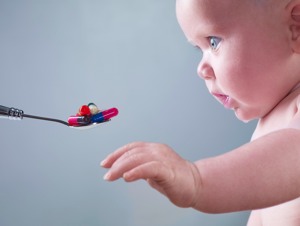
© Adrianna Williams/Corbis
The misuse of pharmaceuticals, over-the-counter medications and other types of drugs and alcohol on children should be considered a form of child abuse on par with neglect and physical, sexual and emotional abuse, concludes Dr. Shan Yin in a study published this week in the Journal of Pediatrics. Yin, of the University of Colorado and the Rocky Mountain Poison Drug Center at Denver Health, analyzed data on drug and alcohol exposure among children younger than seven that were reported to the National Poison Data System between 2000 and 2008. Yin then narrowed from some 21.4 million such exposures to 1,634 which were categorized as “malicious” — meaning that the report suggested the child was a “victim of some other person’s intent to harm [him].”
On average, Yin found that some 160 incidents of harmful use of drugs or alcohol among children younger than seven were reported annually, and of these, two per year resulted in deaths. Both because the study was limited to known pharmaceuticals and alcohol, and because abuse is underreported in general, Yin estimates that these figures represent only a fraction of the true magnitude of the problem. Had common household chemicals or other potentially harmful toxins been included in the study — and were non-fatal incidents investigated with the same rigor that deadly poisonings are — it might paint a clearer picture of the problem. For now, however, he writes that the current analysis “provides a starting point for estimating the true incidence of this potentially under-recognized problem.”
What would drive parents or other care providers to knowingly drug children without medical reason? Yin says that poisoning can be a component of a larger, ongoing problem of abuse. He writes: “a physically abused baby is likely to be more irritable than usual and the perpetrator may wish to sedate them after an inflicted injury.” It’s also possible that guardians or care givers use pharmaceuticals to sedate children “simply as a respite from the responsibilities of childcare.” Whether or not that care provider intends to cause harm, Yin says, misuse of medication this way “still constitutes maltreatment.” Of course, more sinister motivations for drugging are possible too, he writes — including as a means of punishment, or even amusement.
In a statement about the findings, Yin warns that “non-therapeutic administration of pharmaceuticals to children can result in serious outcomes, including death,” and concludes that malicious misuses of drugs and alcohol should be considered “an important form of child abuse.”

